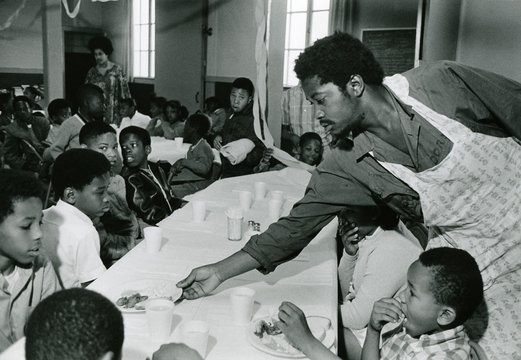
Photo courtesy of irkle Jones and Ruth-Marion Baruch
Armed with firearms and a law book, back in 1966 Huey P. Newton and Bobby Seale boldly patrolled Oakland’s mean streets, confronting the police over their treatment - or mistreatment - of Black people. Insisting on their second amendment right to bear arms and that the so-called “pigs” must obey the letter of the law when interacting with African Americans, their brazen defiance set them on a collision course with the Oakland Police Department, the FBI, the Nixon administration and COINTELPRO (the FBI’s counterinsurgency program designed to splinter the he Black Panthers, the Communist Party, and other social and political movements in the U.S.
As what the New Left called “AmeriKKKa” continues, remarkably, to grapple half a century later with ongoing police brutality against Black people, filmmaker Stanley Nelson’s new movie “The Black Panthers: Vanguard of the Revolution” reminds us that it was precisely this excessive use of force by lawless officers of the law that gave birth to what was originally named the Black Panther Party for Self Defense. Nelson’s rousing 116 minute documentary chronicles the war unleashed by local and federal law enforcement against the Panthers, including raids and shootouts in cities across the nation and the gunning down of members, including Little Bobby Hutton in the Bay Area and the charismatic leader Fred Hampton in Chicago.
“Vanguard” is told through exciting news clips and archival footage plus original interviews with BPP stalwarts who somehow managed to survive, such as Kathleen Cleaver, Emory Douglas, Elaine Brown and Ericka Huggins. Other interviewees include the recently deceased Civil Rights activist Julian Bond, defense attorney Gerald Lefcourt plus former SDS leader and Seale’s Chicago 8 co-defendant Tom Hayden. “Vanguard” reveals some of the party’s spectacular stunts, such as marching into the Sacramento State Capitol bearing arms, outraging Gov. Ronald Reagan. We hear that strident rhetoric, with sizzling sixties slogans such as “Off the pig!” and “All power to the people!” And all done in such style. Who could ever forget those cool black leather jackets and berets? Or Douglas’ provocative poster art rendered in posters and? Then there’s the Panthers’ newspaper aimed at inspiring readers to commit radical acts of resistance, but also the revolutionary politics linking the Black liberation struggle to anti-colonial movements around the world and also advocating unity with progressive whites.
Nelson, the chronicler of a cause, also portrays the side of the party motivated by a desire to serve the people: The Panthers’ free breakfast program for poor children (accompanied, admittedly, by heavy doses of indoctrination); the sickle cell anemia screening and awareness, which Nelson reminds us the Panthers pioneered; and Bobby Seale’s quixotic 1973 run in Oakland’s mayoral race, wherein the former political prisoner and eighth member of the Chicago “7” finished second in a nine-person race. (Alas, Seale is not interviewed for “Vanguard,” although the ex-BPP chairman is seen in period footage during the party’s heyday.)
“Vanguard”, however, is no whitewashing. Nelson depicts, although he doesn’t dwell upon, a factionalism that reached its apotheosis with a fight between Eldridge Cleaver and Newton. Having a convicted rapist as a national leader was a dubious proposition, as was Newton’s daft notion of “revolutionary suicide.” Unfortunately, “Vanguard” doesn’t go into enough detail about this split between the party’s domestic and overseas wings. Nevertheless, while the Panthers’ overt militancy may have led to their downfall, the militants’ brazen bravado may very well be what they are best remembered - and beloved - for. “Vanguard” definitely has numerous stand-up-and-cheer moments.
“Vanguard” is essential viewing for anyone interested in the Black liberation fight and New Left of the 1960s/70s. With this latest installment of his ongoing reportage, Stanley Nelson is keeping his eyes on the motion picture prize. “Vanguard” is Nelson’s latest contribution to an awe-inspiring body of work that has already chronicled Black nationalist Marcus Garvey, and the Civil Rights movement with the stellar documentaries 2010’s “Freedom Riders” and 2014’s “Freedom Summer.” What’s next for this great filmmaker - the saga of the Black Lives Matter? Nelson is to the African American cause what “Kino Pravda” filmmaker Dziga Vertov was to the Russian Revolution.
Like “Straight Outta Compton”, which denounces police brutality in that other California community in the 1980s, “Vanguard” exposes police excessive use of force in the Oakland of the 1960s. As such, like “Straight Outta Compton,” “Vanguard” remains, unfortunately, extremely timely and of the moment. While police violence against African Americans hasn’t improved in the past half century, technology has changed. One wonders: If Huey patrolled the “pigs” today to make sure they did not violate citizens’ rights and were held accountable for their misdeeds, would he carry a cell phone instead of a rifle? Nelson reminds us that, to paraphrase Chairman Mao, “political power also grows out of the barrel of a camera lens.”
“The Black Panthers: Vanguard of the Revolution” begins its theatrical release September 2 in New York (at the Film Forum) and September 25 in Los Angeles (at the Nuart Theatre), to be followed by a national rollout. PBS will nationally broadcast “Vanguard” on the “Independent Lens” documentary series in early 2016. For more info see: http://theblackpanthers.com.
L.A.-based reviewer Ed Rampell is The Progressive Magazine’s “Man In Hollywood.” His Progressive interview with America’s former Poet Laureate is in the new book “Conversations With W.S. Merwin.” Rampell co-authored “The Hawaii Movie and Television Book” (see: http://hawaiimtvbook.weebly.com/).
